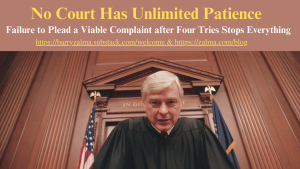No Court Has Unlimited Patience

See the full video at https://rumble.com/v3rtqpq-no-court-has-unlimited-patience.html and at https://youtu.be/dmMROVl86Qg
Scott Manley moved the USDC to dismiss the two claims plaintiff Mark Esquibel asserted against him in the Third Amended Complaint (TAC) for wrongful termination in violation of public policy (“Tameney claim”) and for promissory fraud.
Because Manley was Esquibel’s manager at Kinder Morgan and not his employer, Manley cannot be liable for the Tameney claim as a matter of law. For the same reason, Manley contends that he cannot be liable for promissory fraud resulting from alleged assurances in or around 2008 that Kinder Morgan would provide Esquibel with insurance coverage during his employment. More problematic is that these alleged assurances occurred in 2008 but Manley did not become plaintiff’s supervisor until 2017.
In Mark Esquibel v. Kinder Morgan, Inc., et al., No. 21-cv-02510-WHO, United States District Court, N.D. California (October 17, 2023) the USDC explained why its patience had been exhausted.
ANALYSIS
Esquibel asked for leave to amend to assert totally new claims against Manley, including eavesdropping in violation of California Penal Code section 632 and invasion of privacy, harassment under California’s Fair Employment and Housing Act (FEHA), and claims for intentional and negligence infliction of emotional distress based on the alleged eavesdropping and harassment.
Esquibel did not address the standard for granting leave to amend or explain why – despite the multiple opportunities to amend he was given – he failed to allege these claims in any of his prior four complaints. The claims that he seeks to add now – based on eavesdropping in violation of California Penal Code section 632 and systemic harassment and intimidation based on use of racial slurs – rely on factual allegations that were made in this case at its inception.
In the trial judge’s June 2023 Order, Esquibel was “given one last chance to amend.” In that Order, the court explained to Esquibel what facts were missing but were necessary in order to state viable claims. He then filed the The Amended Complaint only to find it denied and Kinder Morgan’s third motion to dismiss allowing the Tameney claim and the promissory fraud claim to proceed.
Given the multiple opportunities Esquibel has had to amend, the “one last chance” warning given, and the significant prejudice caused not only Manley but Kinder Morgan (who repeatedly and successfully moved to dismiss, resulting in the court’s narrowing of the claims left at issue) by Esquibel’s dilatory tactics and attempts to plead yet more claims based on facts known since the inception of this litigation, further leave to amend was denied. There is simply no excuse for Esquibel sitting on these claims. There has been undue delay and dilatory conduct, causing significant prejudice to defendants.
Esquibel’s piecemeal approach to his pleadings and seeming inability or unwillingness to fully plead his claims despite the Court’s Orders and defendants pointing out the multiple deficiencies in his claims is unacceptable. Construing his opposition to the motion to dismiss as a properly noticed motion for leave to file a Fourth Amended Complaint with wholly new claims against Manley (and logically against Kinder Morgan), the motion was denied. Defendant Manley’s motion to dismiss was granted and the litigation stopped.
Some judges have the patience of Job with litigants and allow them multiple opportunities to find a way to plead a viable cause of action. The judge in this case gave the plaintiff three tries and warned Esquibel that the last order was his “last chance.” Ignoring the warning Esquibel tried a new way to allege a case that had nothing to do with his first three tries. His failure ended the court’s patience and the order was dismissed. Why the court did not sanction Esquibel under Rule 11 is difficult to understand. Court’s need to control their calendar and not be so patient.
 (c) 2023 Barry Zalma & ClaimSchool, Inc.
(c) 2023 Barry Zalma & ClaimSchool, Inc.
Please tell your friends and colleagues about this blog and the videos and let them subscribe to the blog and the videos.
Subscribe to Excellence in Claims Handling at locals.com at https://zalmaoninsurance.locals.com/subscribe or at substack at https://barryzalma.substack.com/publish/post/107007808
Go to Newsbreak.com https://www.newsbreak.com/@c/1653419?s=01
Follow me on LinkedIn: www.linkedin.com/comm/mynetwork/discovery-see-all?usecase=PEOPLE_FOLLOWS&followMember=barry-zalma-esq-cfe-a6b5257
Daily articles are published at https://zalma.substack.com. Go to the podcast Zalma On Insurance at https://podcasters.spotify.com/pod/show/barry-zalma/support; Go to Barry Zalma videos at Rumble.com at https://rumble.com/c/c-262921; Go to Barry Zalma on YouTube- https://www.youtube.com/channel/UCysiZklEtxZsSF9DfC0Expg; Go to the Insurance Claims Library – http://zalma.com/blog/insurance-claims-library
Like this:
Loading…
Related
About Barry Zalma
An insurance coverage and claims handling author, consultant and expert witness with more than 48 years of practical and court room experience.







